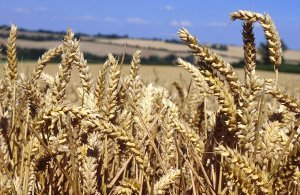Farmers Weekly has been moved to the top shelf at our local shop (Waitrose). I am not sure why. Is it because of some risqué language in the livestock section or the frequent mention of (oilseed) rape in the crops section? Or is it because the powers that be at Waitrose have read the popular book by Yuval Noah Harari entitled Sapiens: A Brief History of Humankind? Naturally, there is a reference to agriculture in the book. The Guardian (I am not a regular reader of the paper) review of the book includes the following paragraph:
It's a neat thought that "we did not domesticate wheat. It domesticated us." There was, Harari says, "a Faustian bargain between humans and grains" in which our species "cast off its intimate symbiosis with nature and sprinted towards greed and alienation". It was a bad bargain: "the agricultural revolution was history's biggest fraud". More often than not it brought a worse diet, longer hours of work, greater risk of starvation, crowded living conditions, greatly increased susceptibility to disease, new forms of insecurity and uglier forms of hierarchy. Harari thinks we may have been better off in the stone age, and he has powerful things to say about the wickedness of factory farming, concluding with one of his many superlatives: "modern industrial agriculture might well be the greatest crime in history".
I am not sure what Harari means by modern industrial farming but it would appear to include both organic and conventional farming. This is because both forms of arable farming typically include growing grain crops.
Nor is Harari alone in these thoughts. I recently went for a check up at the doctors and whilst waiting my turn, I picked up a copy of The Ecologist. The main article stated that we would all be better off if we returned to being hunters and gatherers. Amazingly my blood pressure was at a reasonable level when tested a few minutes later!
 I am not sure where to begin in commenting on these thoughts. Humans were not tempted by the devil to grow wheat. They grew wheat because it offered them a better way of life; being able to put down roots and have a more reliable diet. Long hours would also be spent hunting and gathering and I suspect the limited amount of food available ensured that there was no risk of an over-crowded planet! I am sure there must have been a greater risk of starvation and malnutrition in the Stone Age. Living off the land is a romantic notion but the reality is rather different.
I am not sure where to begin in commenting on these thoughts. Humans were not tempted by the devil to grow wheat. They grew wheat because it offered them a better way of life; being able to put down roots and have a more reliable diet. Long hours would also be spent hunting and gathering and I suspect the limited amount of food available ensured that there was no risk of an over-crowded planet! I am sure there must have been a greater risk of starvation and malnutrition in the Stone Age. Living off the land is a romantic notion but the reality is rather different.
An ever increasingly efficient agriculture has released an ever increasing proportion of the world’s population to escape from what is often the day to day drudgery of producing food. It has afforded authors the education and the time to write books decrying current food production methods.
There is a whole spectrum of opinions on agriculture in society. I note that the new shadow Defra secretary is a vegan. She believes that eating meat is harmful to people and the environment. In some ways it is and it is true that significantly more resources are required to produce a kg of meat than a kg of a vegetarian or vegan alternative. It is just possible that if all humankind gave up eating meat, organically grown crops could feed the world, although there would be increased concern over food security.
However, all these noble notions cannot override the reality of the will of the people. The last leader who tried to force a rural idyll on his country was Pol Pot and look what happened there.
